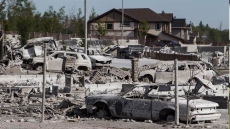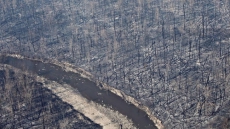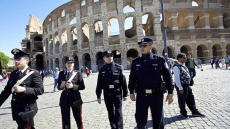Muhammad Ali left his mark on Canadian sports history with a pair of victories over the dogged George Chuvalo, including a memorable 1966 clash at Toronto's Maple Leaf Gardens when The Greatest was embroiled in a controversy over his resistance to the Vietnam War.
The first was a bout that turned Chuvalo into a national hero simply for staying on his feet for 15 rounds against the quickest and most gifted boxer of the era. For Ali, who died Friday at the age of 74 after a long battle with Parkinson's disease, it was a chance to show he would not be bowed by those calling for him to be banned from the sport.
The second fight came in 1972 at the Pacific Coliseum in Vancouver, where Ali vowed to be the first to knock Chuvalo down, only to see the Toronto fighter he once called the Washerwoman absorb his blows without falling for another 12 rounds. Chuvalo never went down in 93 pro bouts.
By 1981, Ali was a shadow of his former self when he lost the final bout of his career to former heavyweight champion Trevor Berbick of Halifax in Nassau, Bahamas.
Chuvalo thought he had lost his chance to face the charismatic Ali when he lost to Floyd Patterson in 1965, but then Ali's career took a turn after he was ruled eligible to be drafted by the U.S. Army. Ali refused, famously saying "I ain't got no quarrel with them Viet Cong."
He had been booked to fight Ernie Tyrrell in Chicago on March 29, 1966, but amid outrage from U.S. war veterans, the Illinois State Athletic Commission declared the bout "illegal" because of Ali's "unpatriotic" stance. No other state would sanction the bout, and Tyrrell pulled out when it looked like there would be little money to be made.
So Ali's handlers, led by Bob Arum promoting his first fight, looked north. Montreal backed out when veterans threatened to boycott Expo '67, but Harold Ballard, owner of Maple Leaf Gardens, took it on. Chuvalo accepted the fight with 17 days notice.
Chuvalo was seen as a second-tier fighter at the time, but won over both the international boxing media and the Canadian public for his courage in the ring.
Most scored the bout 13 rounds to two in Ali's favour, but Chuvalo's relentless attacks and granite chin instead made him a hero in defeat.
"He showed Canadians weren't soft," said Lennox Lewis, another former heavyweight champ.
It took Chuvalo years to appreciate what he had done.

"When people say 'You must be proud of the fight' I say 'Proud of what? I lost the fight,'" he told journalist Stephen Brunt in his 2002 book "Facing Ali." "But in a crazy kind of way it made Canadians feel good. Kind of proud. I made my fellow Canadians proud about being Canadian and that part makes me feel good."
Times had changed by 1972. Ali was arrested for draft evasion in 1967 and didn't fight for four years until his conviction was overturned and he had become a hero to a new, mostly anti-war generation. He was battling his way back to the top when he faced Chuvalo in Vancouver.
The result was the same, a lopsided Ali victory, but he admitted afterward that Chuvalo was "the toughest guy I ever fought."
Q&A: Parkinson's disease
WASHINGTON — Before his death, Muhammad Ali was hospitalized with respiratory problems, his health complicated by advanced Parkinson's. The boxing great had lived with the degenerative disease for three decades. Here are some questions and answers about the disease:
Q: What is Parkinson's?
A: Parkinson's is a neurologic disease that robs people of control over their movements. It typically starts with tremors, and is characterized by slow movement, a shuffling gait, stiff limbs, balance problems and slurred speech.
Q: Who gets it?
A: About 1 million Americans are living with Parkinson's, and an estimated 4 million to 5 million people worldwide, according to the National Parkinson Foundation. It usually appears after age 60, although sometimes it can develop before age 40.
Q: What causes it?
A: The exact cause isn't known but Parkinson's develops when cells that produce one of the brain's chemical messengers, called dopamine, begin to deteriorate and die. Dopamine transports signals to parts of the brain that control movement. Parkinson's symptoms appear after enough dopamine-producing cells die that there's too little of this neurotransmitter in the brain.
Q: Is there a cure?
A: There is no cure but there are a range of treatments, from medications that affect dopamine levels to a surgically implanted tremor-blocking device. Patients also can benefit from physical and occupational therapy.

Q: What's the prognosis?
A: Symptoms worsen over time, usually slowly. The severity of symptoms, and how quickly they progress, varies widely between patients. In advanced cases, people may be unable to walk or care for themselves. They also can suffer non-motor symptoms, including depression and memory and other cognitive dysfunction.
While Parkinson's itself isn't considered fatal, people can die from complications of the disease.
Q: What complications are of most concern?
A: Lung problems are a risk as muscle weakness impedes the ability to cough and to swallow. While any kind of pneumonia can occur, what's called aspiration pneumonia — when bits of food or liquid land in the lungs instead of being swallowed properly — is the leading cause of death among Parkinson's patients, said National Parkinson Foundation medical director Dr. Michael S. Okun.





